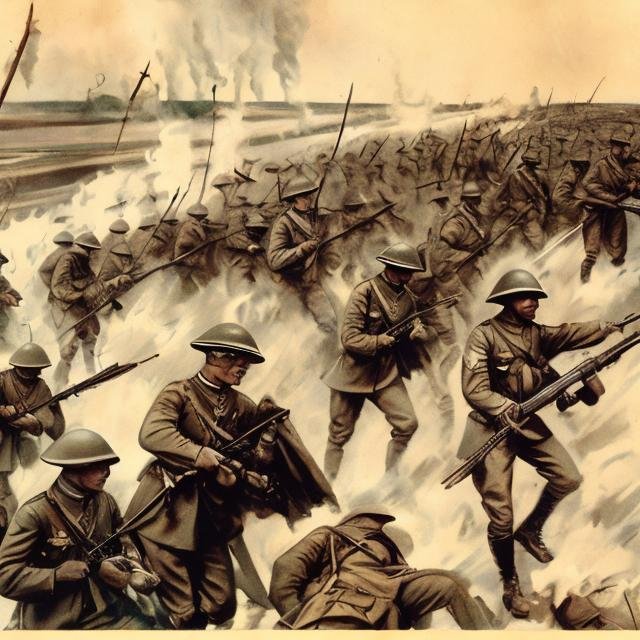World War I: A Pivotal Moment in History

World War I, often referred to as the Great War, was a conflict of unprecedented scale and devastation that marked a turning point in modern history. Spanning from 1914 to 1918, it involved most of the world's great powers and their allies, leading to profound political, economic, and social changes. In this comprehensive blog post, we will explore the origins, major battles, key figures, and lasting impacts of World War I in an effort to understand the causes and consequences of this global conflict.
I. Prelude to the Great War
1.1 The System of Alliances
The origins of World War I can be traced to the complex system of alliances that had developed among the major European powers in the late 19th and early 20th centuries. The entangling alliances created a delicate balance of power that was easily disrupted.
1.2 Nationalism and Imperialism
Nationalism and imperialism fueled tensions among the European nations. The desire to expand territories and assert national identity set the stage for conflicts in the Balkans and beyond.
1.3 The Assassination of Archduke Franz Ferdinand
The assassination of Archduke Franz Ferdinand of Austria-Hungary by Gavrilo Princip, a Serbian nationalist, in Sarajevo on June 28, 1914, served as the catalyst for the outbreak of war. Austria-Hungary's subsequent ultimatum to Serbia triggered a chain reaction that engulfed the world in conflict.
II. Major Players and Alliances
2.1 The Triple Entente
The Triple Entente, consisting of France, Russia, and the United Kingdom, formed one side of the conflict. These nations shared mutual defense pacts and diplomatic ties that drew them into the war.
2.2 The Central Powers
The Central Powers, led by Germany, Austria-Hungary, and the Ottoman Empire, comprised the opposing alliance. The alliance's aim was to maintain the existing balance of power in Europe.
III. The Great War Unfolds
3.1 The Schlieffen Plan
Germany's strategy, known as the Schlieffen Plan, aimed to quickly defeat France and then turn its full attention to the Eastern Front against Russia. This plan precipitated the invasion of Belgium, bringing the United Kingdom into the war.
3.2 Trench Warfare
The Western Front became a brutal stalemate, characterized by trench warfare. Soldiers endured horrific conditions, with mud, disease, and constant shelling. The battles of Verdun and the Somme are emblematic of this period.
3.3 Eastern Front and Russian Revolution
The Eastern Front witnessed significant battles and a great deal of movement. Russia's involvement placed immense pressure on Germany and Austria-Hungary. The Russian Revolution of 1917 led to the collapse of the Russian Empire and its withdrawal from the war.
3.4 Gallipoli Campaign
The Allies launched the ill-fated Gallipoli Campaign in 1915 to open a supply route to Russia. However, the campaign was a disaster, resulting in heavy casualties and a withdrawal.
IV. Key Figures
4.1 Archduke Franz Ferdinand
Archduke Franz Ferdinand's assassination was the spark that ignited World War I. His death set in motion a series of events leading to the declaration of war.
4.2 Kaiser Wilhelm II
Kaiser Wilhelm II of Germany played a pivotal role in the escalation of the war. His militaristic ambitions and aggressive foreign policy contributed to the outbreak of hostilities.
4.3 Woodrow Wilson
U.S. President Woodrow Wilson initially maintained a policy of neutrality but later played a central role in shaping the post-war world through his Fourteen Points and his vision for the League of Nations.
V. The Home Front
5.1 Total War
World War I marked a transition to a concept of "total war," where entire societies were mobilized for the war effort. This entailed the conscription of soldiers, economic and industrial mobilization, and propaganda campaigns.
5.2 Women's Suffrage and Changing Roles
The war had profound effects on societal norms. Women took on new roles in the workforce and contributed to the war effort, ultimately advancing the cause of women's suffrage.
VI. The Armistice and the Treaty of Versailles
6.1 Armistice
On November 11, 1918, an armistice was signed, effectively ending the fighting. The armistice marked the beginning of a complex and contentious peace process.
6.2 Treaty of Versailles
The Treaty of Versailles, signed in June 1919, officially ended the war. It imposed significant territorial losses and reparations on Germany and established the League of Nations as a means of maintaining international peace and security.
VII. The Aftermath
7.1 Casualties and Destruction
World War I resulted in catastrophic human and material losses. Millions of soldiers and civilians perished, and entire regions were devastated.
7.2 Redrawing of Borders
The war led to the disintegration of empires, including the Austro-Hungarian, Ottoman, and Russian Empires. New nations and borders emerged across Eastern and Central Europe.
7.3 The League of Nations
The League of Nations, founded in the aftermath of the war, aimed to prevent future conflicts. However, it faced significant challenges, ultimately failing to prevent the outbreak of World War II.
VIII. Lasting Impact
8.1 Seeds of Future Conflict
The unresolved issues and harsh terms of the Treaty of Versailles sowed the seeds of future conflict. The economic hardships and humiliation experienced by Germany contributed to the rise of Adolf Hitler and the outbreak of World War II.
8.2 Changes in Technology and Warfare
World War I witnessed significant developments in military technology, including tanks, poison gas, and air warfare. These innovations shaped the nature of warfare in the 20th century.
8.3 Cultural and Artistic Movements
The war had a profound impact on art, literature, and culture. It gave rise to movements like Dadaism and inspired works that reflected the disillusionment and trauma of the era.
Conclusion
World War I stands as a pivotal moment in history, reshaping the political, social, and cultural landscape of the 20th century. The war's consequences, including the emergence of new nations, the reconfiguration of global power dynamics, and the lessons learned about the dangers of nationalism and imperialism, continue to resonate today. As we reflect on the Great War, we must remember the immense sacrifices made and the imperative of preventing such catastrophic conflicts in the future.
What's Your Reaction?

















